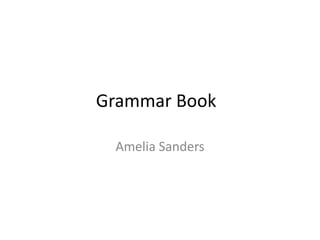
Grammar book
- 1. Grammar Book Amelia Sanders
- 2. Table Of Contents 1. Nationalities 2. Stem changers 3. Para 4. IOP 5. Pronoun placement 6. Gustar 7. Affirmitive and negative words 8. Superlatives 9. Reflexives 10. Affirmative commands and irregulars 11. Negative commands and irregulars 12. Sequencing events
- 4. Stem Changers Almorzar O>UE Pedir E>I Almuezo Almorzamos Pido Pedimos Almuezas Almorzaís Pides Pedís Almueza Almuerzan Pide Piden Pensar E>IE Jugar U>UE Pienso Penamos Juego Jugamos Piensas Penaís Juegas Jugaís piensa Pienan Juega Juegan
- 5. Para Para means “for” • Indicates the recipients of an item • Indicates a purpose • Indicates an implied purpose • Used with an infinitive to mean “in order to do something”
- 6. IOP Me/Nos Tú/Vos Le/Les
- 7. Pronoun Placement 1. Attach the pronoun to the infinitive 2. Attach the pronoun to a progressive tense 3. Attach the pronoun to an affirmative command 4. Place the pronoun before a conjugated verb
- 8. Gustarlike” Gustar means “to me gusta nos gusta te gusta os gusta le gusta les gusta • When you talk about things that people like, change the form of gustar to match the singular or plural nouns for those things. • Singular: • Me gusta la idea • Nos gusta la idea • Plural: • Me gustan las personas • Nos gustan las personas • The form of gustar matches the noun, not the speaker.
- 9. Affirmative and Negative Words Affirmative Negative • Algo – something • Nada – nothing • Alguien – someone • Nadie – no one • Algún/alguno(a) – same • Ningún/ninguno(a) – none; not any • Siempre – always • Nunca – never • También – also • Tampoco – neither; either Notes • If a verb is preceded by no, words that follow must be negative. A double negative is required in Spanish when no precedes the verb. • No qiero nada – I don’t want anything • Carlos no quiere ninguno – Carlos doesn’t want any • If a negative word such as nunca or nadie comes before the verb, a second negative is not needed
- 10. Superlatives • Isimo/isimos isima/isimas • Suffixes added to adjectives/adverbs • Equal to extremely/very before an adjective or adverb • Adjective/adverb ending in –c/-g/-z change spelling to qu/gu/c Difícil Dificilsimo Feliz felicisimo Malo Malisimo
- 11. Reflexives •Used to describe people doing things for themselves •Example: washing yourself, combing your hair. •Reflexive pronouns are used with reflexive verbs to indicate that the subject of the sentence receives an action of the verb. •Many verbs can be used with or without reflexive pronouns. If there is no reflexive pronoun the subject does not receive the action. •When using the infinitive form of a reflexive verb after a conjugated verb, the correct reflexive pronoun must be used.
- 12. Affirmitive Tú Commands • To give instructions or commands Caminar Camina Camina en el parque Irregulars Come toda la Infinitive Affirmitive tú command Comer Come hamburguesa. Decir Di Abre la puerta. Hacer Haz Abrir Abre Quiero entrar. Ir Ve Poner Pon Salir Sal Ser Pronoun Placement Tener Venir Se Ten Ven •When you use a pronoun with an affirmative command, the pronoun attaches to the command. •Ex: ponTE otra camisa •When using an object pronoun, attach the pronoun to the end of the command •Ex: Cruza el parque > Cruzalo
- 13. Negative Tú Commands •Used when telling someone what NOT to do. •Formed by taking the the you form of the present tense, dropping the –o, and adding Pronoun the appropriate ending. Infinitive yo form negative tú command Placement •Object Pronouns precede the Hablar hablo no hablas Verbs in negative commands, just as with other conjugated Volver vuelvo no vuelvas verbs. • Ex: No lo uses. (Don’t Irregulars use it) •None of the yo forms end in –o. Infinitive (yo form) Negative tú commands Dar (doy) No le des mi dirección a nadie. Estar (estoy) No estés triste. Ir (voy) No vayas a la tienda.
- 14. Sequencing Events • Primero - first • Entonces – then • Luego/después – later/after • Por fin – done • Antes de/después de – before/after • Por la – in/during the (time) • Los lunes – on Mondays
- 15. Deber + infinitive -should/ought to -Debo estudiar más. Debo Debemos Debes Debe Deben